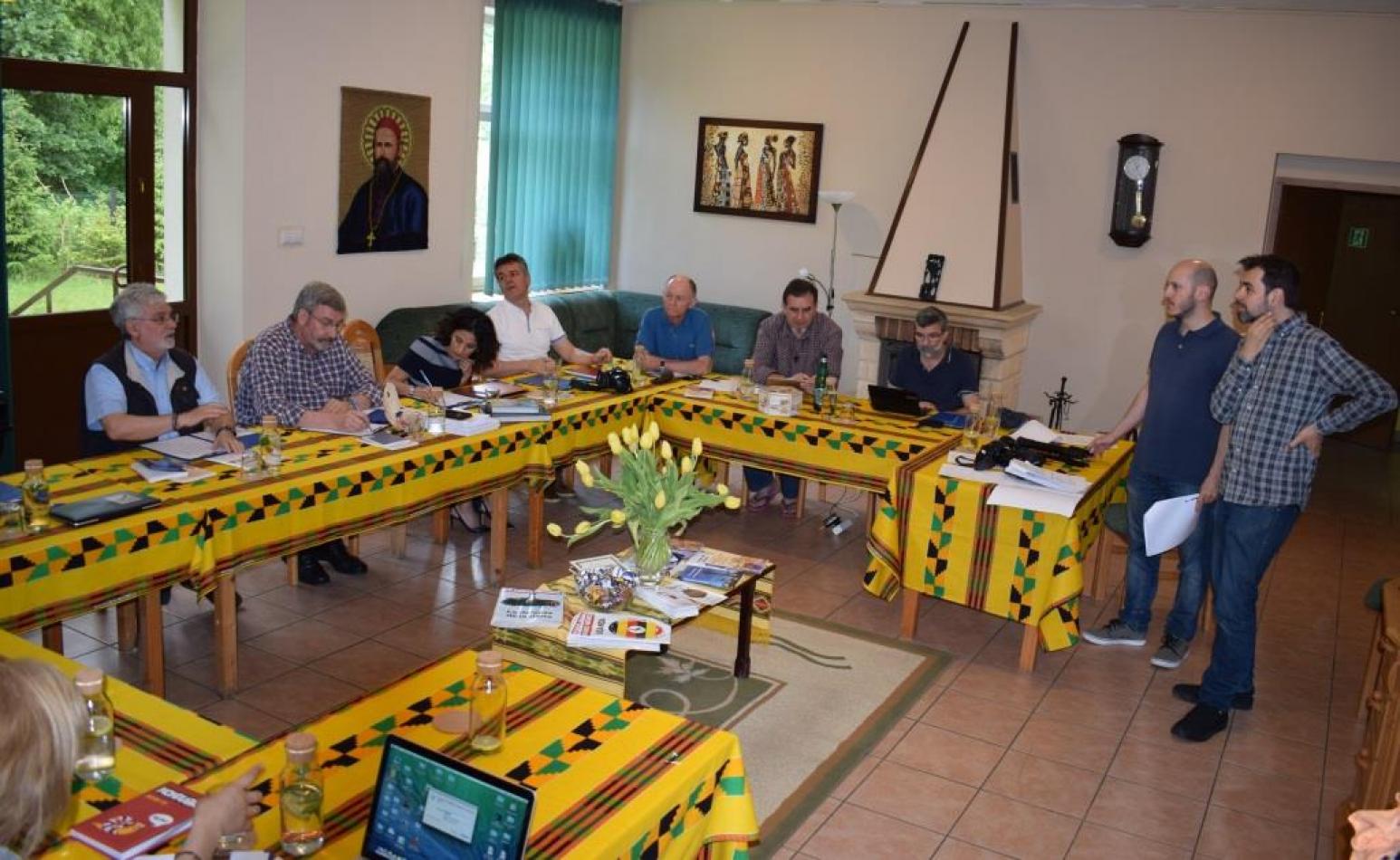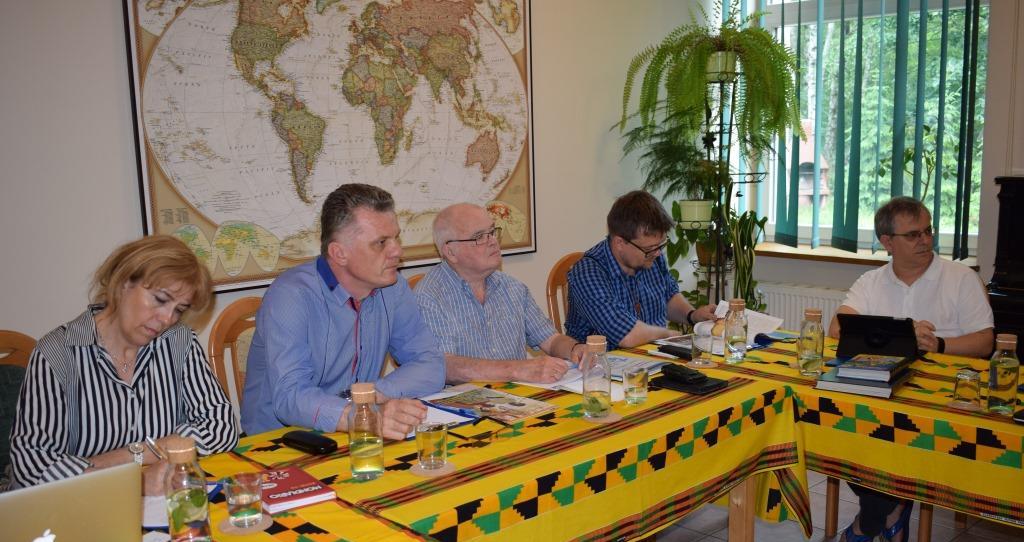Daniel Comboni
Comboni Missionaries
Institutional area
Other links
Newsletter
Wednesday, May 30, 2018
I would like to share with you some considerations about Mission Promotion and some proposals for the drafting of a Provincial Directory of Mission Promotion. (Fr. Mariano Tibaldo, mccj)
PROVINCIAL DIRECTORY OF MISSION PROMOTION
Rome 30/5/2018
Dear Confreres, may the Lord fill you with the joy of the Gospel.
I would like to share with you some considerations about Mission Promotion and some proposals for the drafting of a Provincial Directory of Mission Promotion.
The Directory of the Provincial Secretariat of the Mission that I sent you some time ago contained the ‘job description’ of the secretariat, outlining the nature, tasks, purpose and structure of the same. The Directory sought to overcome some shortcomings present in the Directories of the past, trying to give the Secretariat a precise identity and specific areas of work. It was not infrequent that the Provincial Secretariat (PS) of Mission (or, as it was called, of evangelisation) was entrusted with very different tasks that did not belong to its areas of work: from the organisation of provincial assemblies to that of provincial retreats, to name just a few. Many of the Directors of the PS of Mission that I have read also contained many statements of principle but without delineating its areas, the practical goals and the structure of the Secretariat that could help the members to make a qualified contribution to mission in the province.
The revision of the directory of the PS of Mission is even more essential since the General Chapter of 2015 decided to merge the Secretariat of Evangelisation, Mission Promotion and the Offices (Laity and JPIC) into a single Secretariat. The Directory of the PS of Mission should therefore express this new situation.
In the last Assembly of Mission Promotion of the English-speaking Circumscriptions of Africa in Addis Ababa, a Provincial Directory of Mission Promotion (PD of MP) was discussed several times. First of all I would like to underline the difference between the Provincial Directory of the Mission and that of Mission Promotion, especially as regards the purpose of the two documents. The first describes the work and the functioning of that technical-consultative-operative organ that is the Provincial Secretariat of Mission, the second one describes not so much the MP Secretariat (which has now, in fact, merged with the Secretariat for Mission) but, rather, what is intended for Mission Promotion with regard to objectives, tasks, means, structures, people involved, contact persons, etc. This does not mean that in the Secretariat for Mission there should not be a sector that meets and discusses the problems of Mission Promotion; it must be kept in mind, however, that the person in charge of Mission Promotion is part of the Provincial Secretariat for Mission and also that Mission Promotion is none other than one of its sectors.
I would like to point out some fixed points and important dimensions of Mission Promotion that should orientate us in the drafting of a possible Provincial Directory of MP.
- First of all, it seems to me necessary to point out that it is no longer possible to think and ‘do’ mission in sectors, as if each one followed its specialisation, without taking into account that all the dimensions of the mission are involved in missionary activity. I repeat what I wrote to the Assembly of the Mission Promotion in Addis Ababa: “By now, the boundaries between evangelisation, mission promotion, vocation promotion and Justice and Peace are not as clear as they were probably once, when the mission was framed in a geographical paradigm. Now, whoever does MP, also does evangelisation and is also a vocation promoter. This does not mean that, in a circumscription, some confreres do not have specific tasks of Vocation or Mission Promotion. The complexity of the mission and of the local realities requires it – like for example the animation of missionary groups in parishes and young people in schools, the management of mission Sundays, the contact with benefactors and, above all, the professionalism required in the media world.”
- The General Chapters (at least from 1991 onwards) have emphasised the change in the missionary paradigm that necessarily has involved the way of doing MP. If the mission is an evangelical proclamation and promotion of the values of the Kingdom, the aim of the MP is to stimulate the Church and the society to defend life in all its dimensions (AC ’09 n.180.2). I would like to reiterate that the purpose of the MP is much wider than just ‘talking about mission’, asking for prayers and acts of solidarity for the ‘missions’, awakening the local Church to its ‘missionary duty’. This too, is necessary of course. Drawing on the previous Chapters, especially on Chapter 2009 (No. 183-185), now the MP has the task of:
- sensitising the local Churches to proclaim the Gospel beyond their own frontiers (but, I would add, even within their own boundaries: how many ‘peripheries of the Gospel’ are inside the confines of a local Church!).
- promoting cooperation among the Churches, stimulating mutual knowledge and sharing the riches and the diversity of the universal Church.
- the prophetic announcement and denunciation against all injustices and oppressions. I also remind all that the work of lobbying and advocacy is part of the prophetic character of the missionary announcement, as the 2009 General Chapter reminds us (AC ’09 No. 184).
- forming leaders so that they themselves become the protagonists of transformation.
In short, the task of MP is:
Information (which can become prophetic denunciation).
Formation of missionary awareness of the people of God.
Proposal of solidarity (prayer and sacrifice, economic assistance and explicit proposals of the missionary vocation in all its forms - AC ’97 No. 102).
- Let me add other three dimensions that should be specified in the PD of Mission Promotion:
- The necessary collaboration with all local forces and above all with the Comboni Family. It is important that this collaboration is defined in the PD of MP: the people involved, how the work is done, etc. The mission promoter, the solitary knight of our many practices of promotion in the past, no longer has any reason to exist; on the contrary, his work can be counterproductive if it does not have the seal of continuity born out of effective collaboration.
- The importance of community dimension: the MP is a community event, in the planning at the circumscription, zonal and local level, as well as in the dimension of the witness of a community that lives the Gospel, a welcoming and hospitable community, where differences of culture and character are welcomed and regarded as values. Mission Promotion, before being the task of a specific person, is a community event that involves all the members and the communities of the Circumscription, but, at the same time, MP involves a common planning of the work: therefore the strategies of action, the means, the persons of reference and the times of meeting of the MP sector must be clearly stated in the Directory. The Directory should also prepare the ways and the times for the handing over of the assignment to introduce the new promoter to the task and responsibility.
- The preparation of the mission promoter. An element normally disregarded in the circumscription’s planning but which should be present and clearly expressed in the PD of MP (ways and times of preparation, as well as the need to outline the identity of the promoter).
In conclusion. To rethink about Mission Promotion in the changed conditions of today’s world, of the mission and the Church seems to me a necessary and unavoidable task.
Dear confreres, I remain at your disposal for suggestions, contributions and / or corrections. With many thanks.
Keeping you always in my heart and in a spirit of friendship,
Fr. Mariano Tibaldo, mccj





